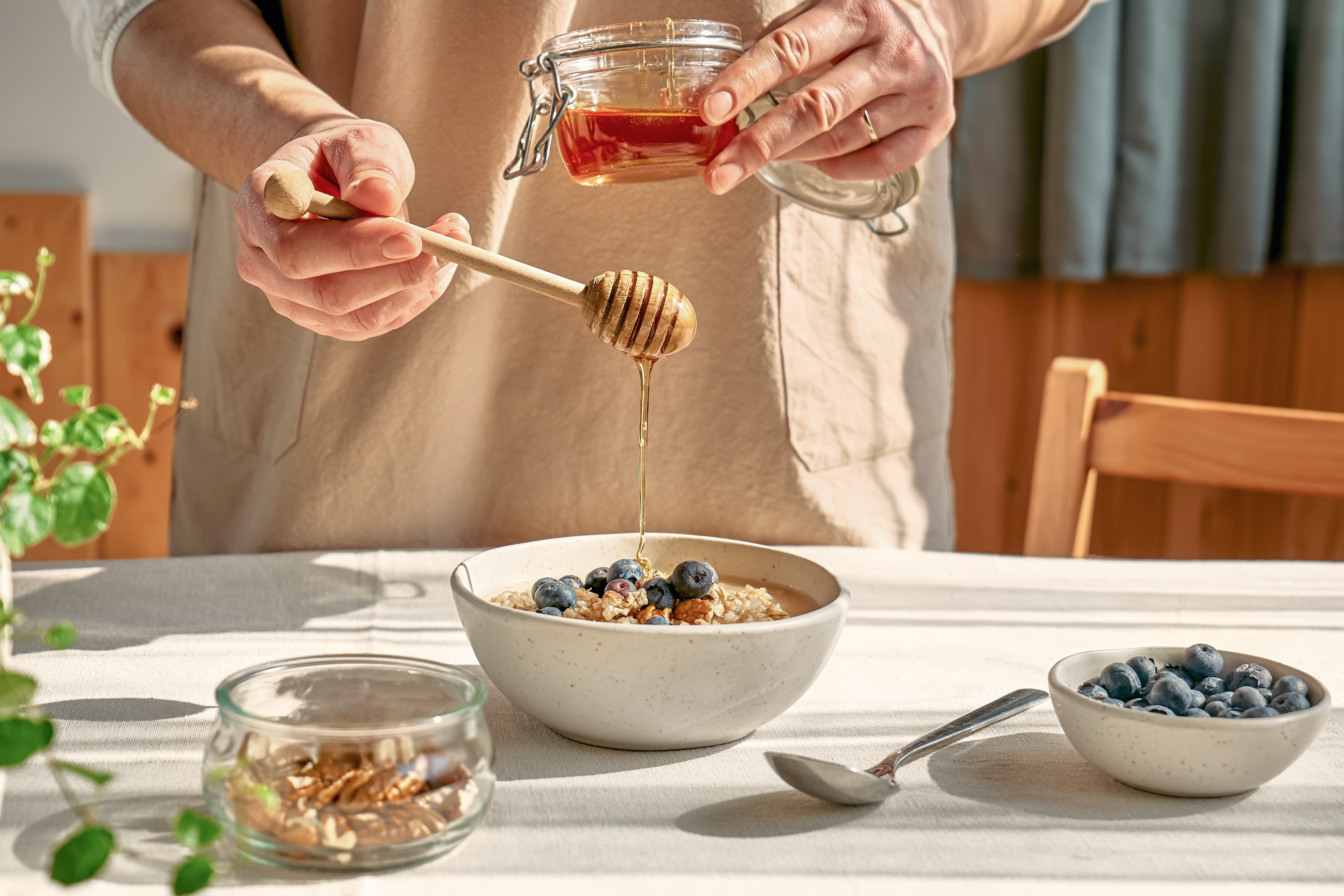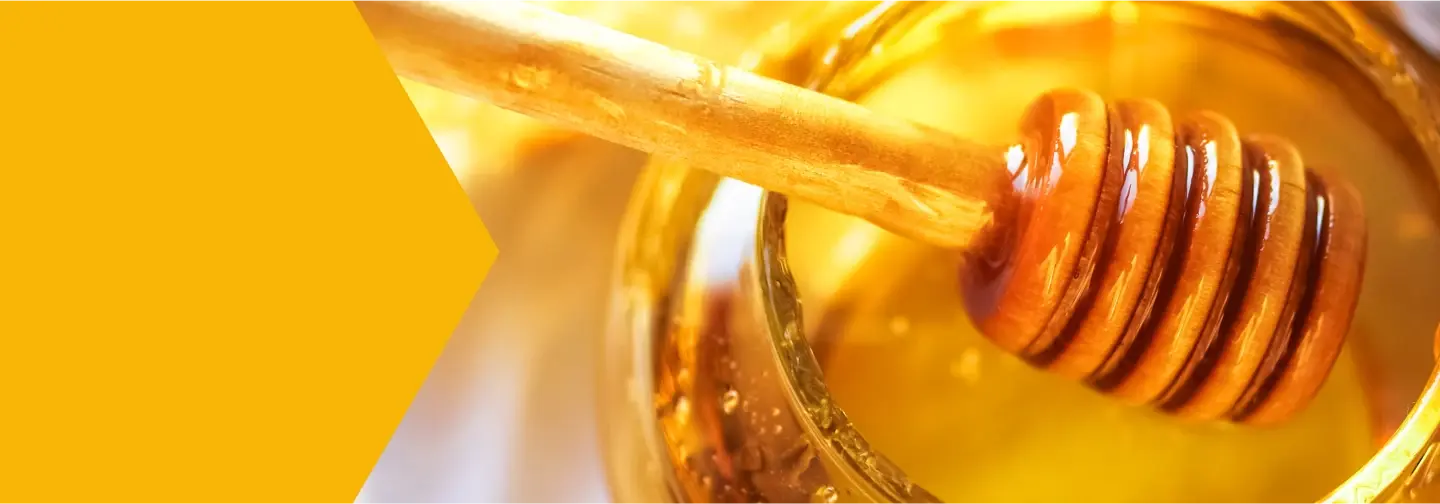There are many reasons why honey sometimes gets the nickname "liquid gold".
Not only is it a delicious sweetener for all sorts of recipes and snacks, but there are also many reported benefits of honey.
At Zarbee’s, we can’t get enough of the stuff! Honey features throughout our whole product range –but what makes it so special?
From helping with coughs and irritated throats to offering an alternative to refined sugar, read on to learn more about honey’s reported health benefits. But first, let’s dive into the origins of honey and find out why it’s been used for thousands of years.
Let’s dive into the origins of honey and find out why it’s been used for thousands of years.

Where did it all begin?
How honey is made
Before we explore why honey can be good for you, we need to understand where it comes from and, of course, we start with bees.
The honey-making process is both fascinating and a little peculiar. After bees collect nectar from flowers, they take it back to their hive and regurgitate it. There, it’s stored in honeycomb where the fanning of bees’ wings helps evaporate the moisture. This is what turns honey into the sticky, sweet liquid we know and love.
The first uses of honey
The exact origin of humans consuming honey and using it for its benefits is difficult to pinpoint. Historians have even found evidence to suggest it was used in prehistoric times.
Throughout history, it has been used by people all over the world. For example:
In Spain, cave paintings discovered in Cuevas de la Araña are thought to depict the earliest known record of humans foraging for honey. These, date back around 8000 years.
In Ancient Egypt, the earliest records of beekeeping were found in a temple that was built in 2400BC near Cairo. The Egyptians also used to bake honey into cakes and offer it as gifts to their gods. It also served as an ingredient in the embalming process.
In Ancient Greece, people also used it as an offering for the gods. They also used it in many recipes – including the alcoholic drink of the gods, mead.
In Mesopotamia (modern-day Iraq), Babylonian and Sumerian cuneiform writings have been found that date back to around 2000 BC. These alluded to using honey in offerings and sacred buildings.
Since then, honey has had many uses – from food and drink to religious rituals and as a natural medicine. It was the major source of sweetness before processed sugar, and it remains hugely popular today.
While it’s most commonly used as a sweetener to add to tea, baked goods, and sauces, there are also many health benefits you can get from honey. Read on as we explore a few below.
1. Honey & cough relief
Honey is renowned for its cough-relief properties, and has been used as a natural home remedy for coughs for years. The World Health Organisation (WHO) also endorses the inclusion of honey as a cough remedy for children (although it should only be given to children over the age of 12 months).
Coughing is the natural reflex action of your body trying to clear your airways from irritation or excess mucus. But, especially at night, coughing can disturb your sleep and leave you feeling tired and irritable.
The consistency of honey means it can coat an irritated throat and mucus membranes. This has a soothing effect that can reduce cough frequency and severity, making honey a great home remedy for a dry cough.
Which honey products can I use for cough relief?
If you’re suffering with a cough, consider using Zarbee’s Adult Cough & Sore Throat Syrup, or the Children’s Cough & Sore Throat Syrup for kids above the age of 2. These syrups contain natural, pure honey to soothe the
urge to cough, glycerol to protect your throat, and ivy leaf extract to help clear out excess mucus.
Find out more about how to treat different types of cough.
2. The minerals and nutrients in honey
Many minerals and nutrients have also been found to be present in honey. This can depend on the type of honey, but it has been found to contain phosphorus, calcium, potassium, and magnesium.
Although they only exist in small amounts, the nutrients in honey make it a healthier dietary choice than regular sugar, according to some studies. Of course, just like sugar, honey should be consumed in moderation.
3. Honey as a sugar alternative
Another honey health benefit is that it has a slightly lower glycaemic index (GI) than refined sugar. GI measures how quickly a food will increase your blood sugar when consumed on its own. This means that it will still raise your blood sugar levels, but not quite as quickly as sugar would.
Honey is also generally sweeter than sugar, meaning you may be able to use less of it in your cooking. Plus, it's a naturally stable food, meaning it can easily be stored at room temperature in dry conditions and rarely spoils.
Generally, it can be a great alternative to sugar when cooking – although it does contain a few more calories.
Can everyone benefit from honey?
Many people can experience the health benefits of honey. However, some people can be allergic to honey and have mild to severe reactions, especially those who are already prone to pollen allergies.
If you have any concerns, speak to your GP.
Honey should also not be given to babies under 12 months. This is because their digestive systems are still developing. Consuming honey increases the risk of developing infant botulism, a rare type of poisoning which can cause serious illness.
However, for many people, honey can have many health benefits. But, before you start adding it to everything, just remember that honey still counts as an added sugar so it should always be consumed in moderation.
For any products containing honey, including Zarbee's, always read the label.
